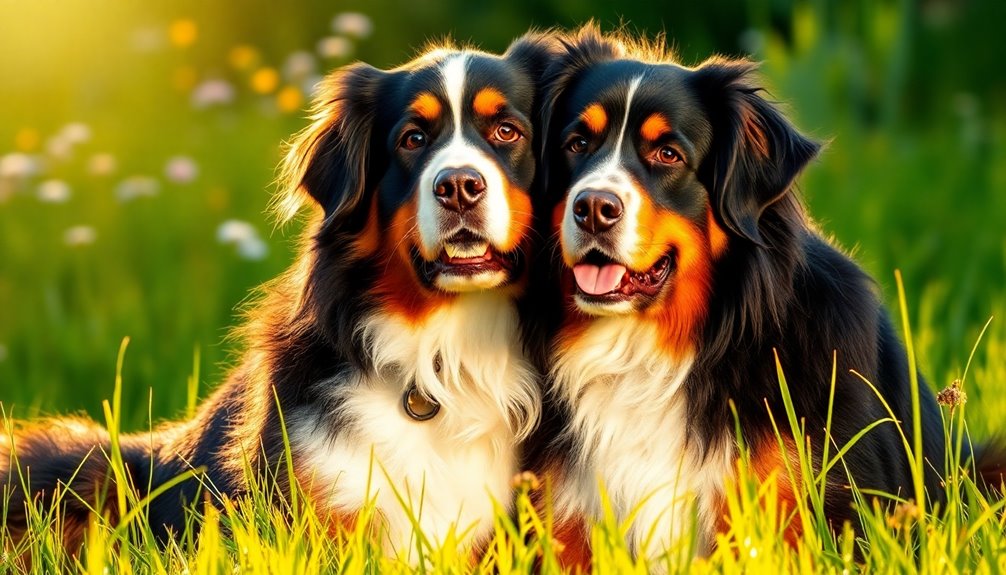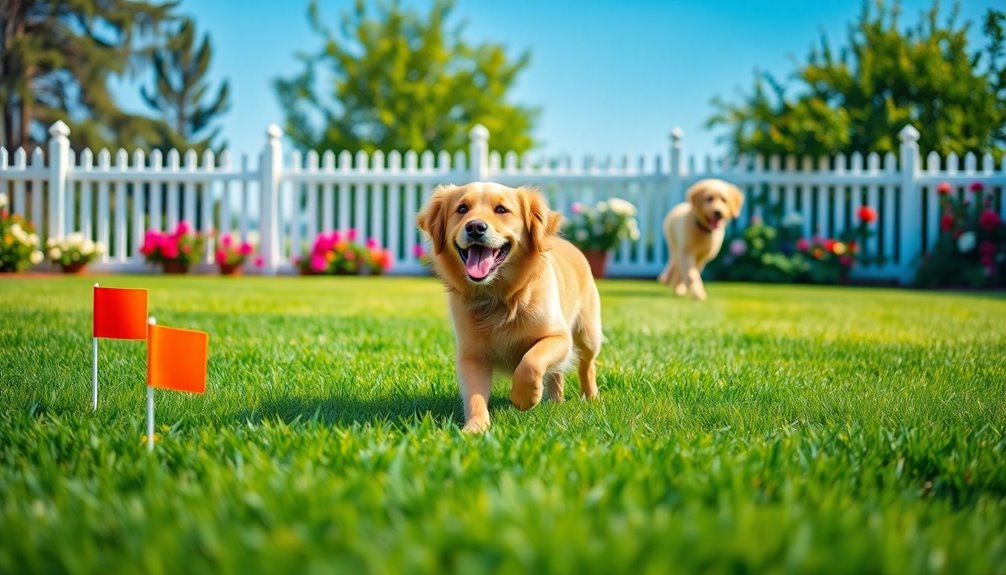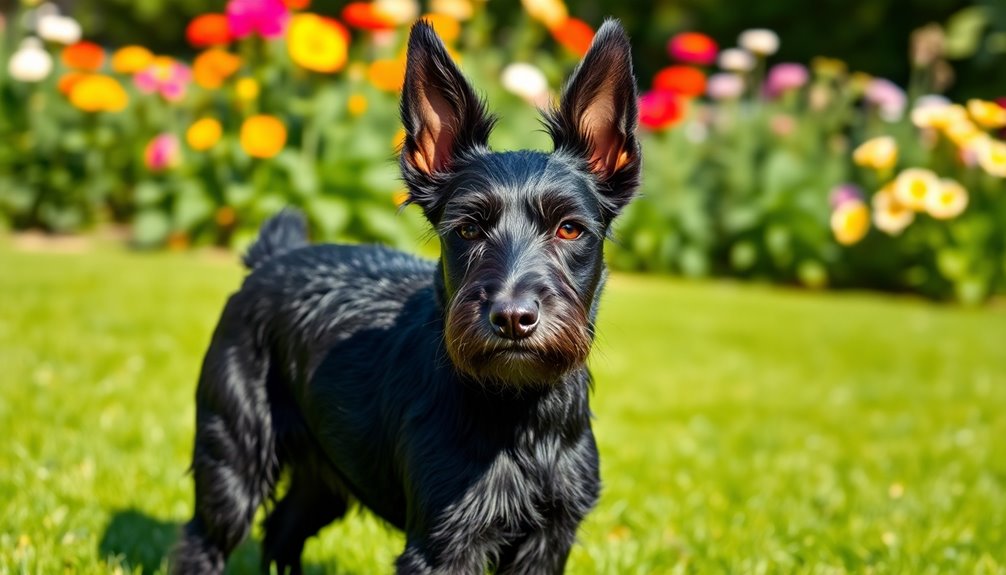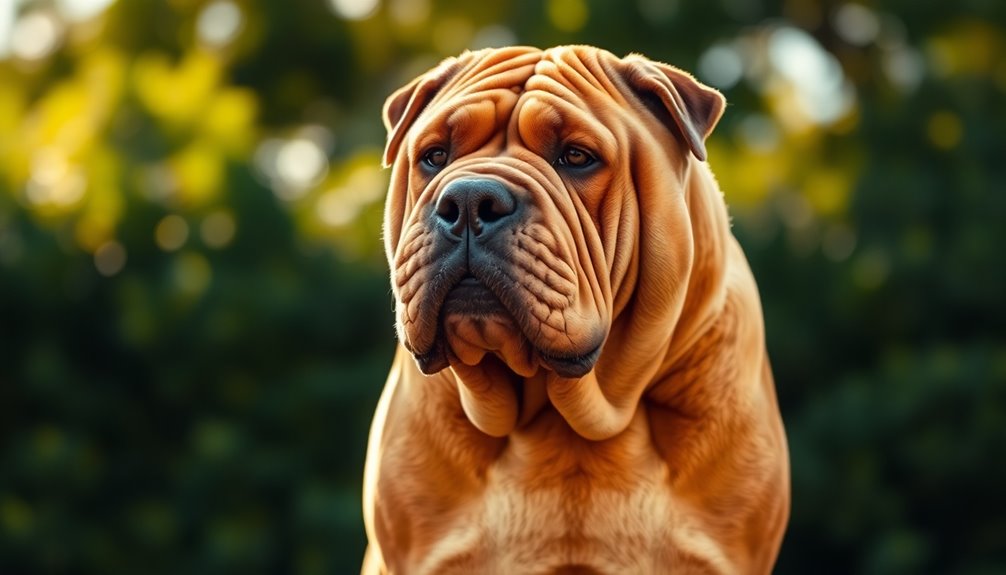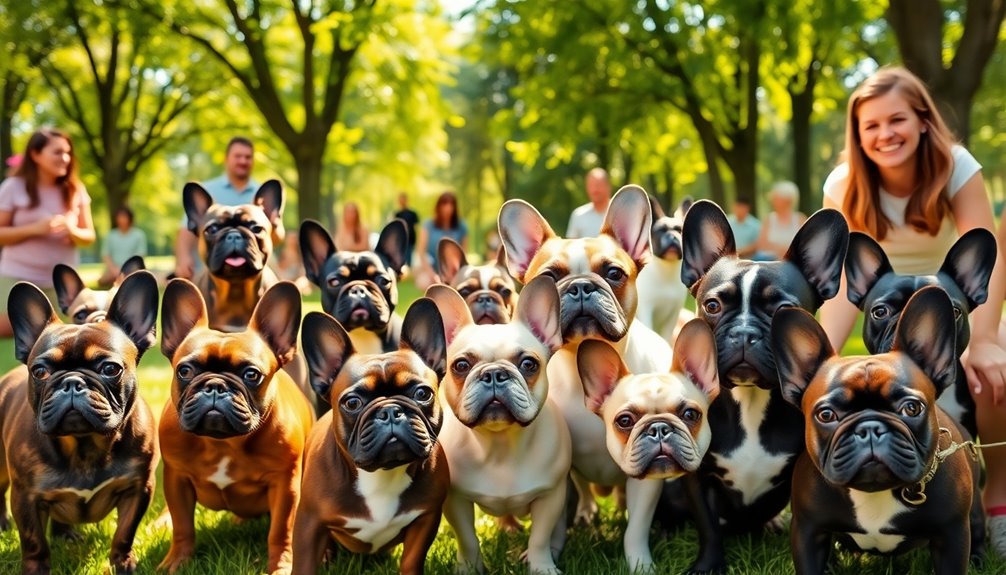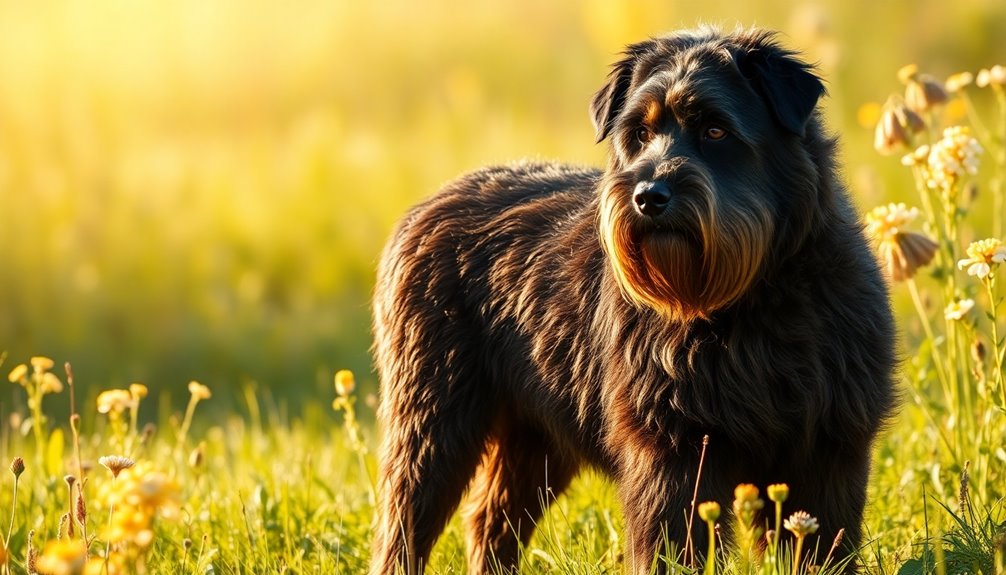Bernese Mountain Dogs are truly gentle giants that'll capture your heart. Known for their loyal and affectionate nature, they make perfect companions for families and individuals alike. With their striking tri-color coat and friendly demeanor, they're both beautiful and approachable. These dogs require regular grooming to manage their thick fur, and they need daily exercise to stay happy and healthy. Their strong bond with family members ensures they're protective and patient, especially around children. If you're curious about what makes them unique and how to care for them, you might just uncover some fascinating insights next.
Key Takeaways
- Bernese Mountain Dogs are known for their gentle and patient demeanor, earning them the nickname "gentle giants."
- They are extremely loyal and form strong bonds with their families, making them excellent companions.
- These dogs are friendly towards children and other pets, fostering a warm and safe home environment.
- Regular exercise and grooming are essential for maintaining their health and well-being.
- Their lifespan typically ranges from 6 to 10 years, with cancer being the leading health concern.
Introduction
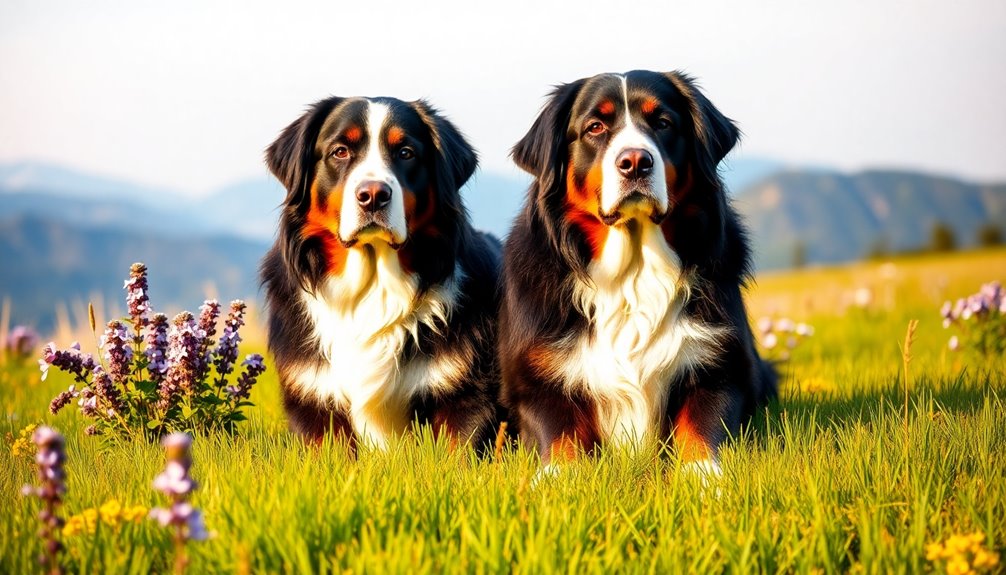
Bernese Mountain Dogs are a striking breed known for their large size and beautiful tri-colored coats. Males typically weigh between 80 to 115 pounds and stand 25 to 27.5 inches tall, while females weigh 70 to 95 pounds and are 23 to 26 inches in height. Their long, silky fur is primarily black, accented by rust-colored spots and white markings, giving them a distinctive appearance.
With their sturdy and powerful build, they exude both strength and grace.
These gentle giants boast a good-natured temperament, making them affectionate and loyal companions. They're friendly towards strangers, other dogs, and pets, and their playful nature ensures that they enjoy both active playtimes and relaxed evenings. However, they often form a strong attachment to one particular person or family member. Loyalty and devotion are key traits that make them especially beloved by families.
When it comes to care, Bernese Mountain Dogs need medium exercise and benefit from access to a yard. Their thick coat requires regular grooming, especially during shedding season, and they thrive on companionship.
While they mightn't be suitable for warm climates, their loving demeanor makes them a cherished addition to any family.
History and Origin
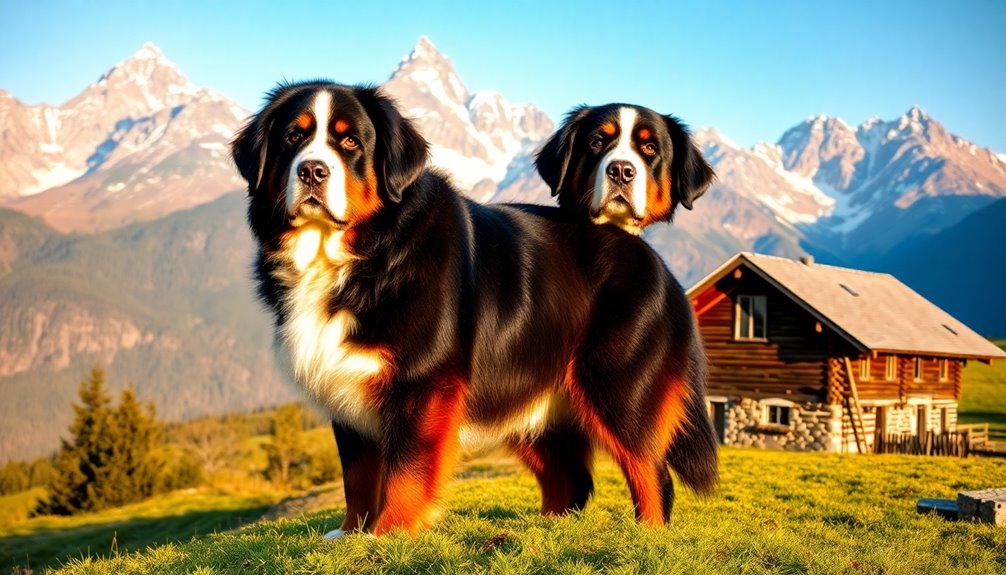
The Bernese Mountain Dog has roots that stretch back over 2,000 years to the Roman soldiers who crossed the Alps.
These dogs weren't just companions; they played vital roles as draft animals and farm helpers, assisting in herding and guarding livestock. Their development involved crossbreeding with guardian dogs that were known for their strength and intelligence.
You'll find that their strong work ethic and loyalty made them indispensable on Swiss farms.
Where and when the breed originated
Originating in the picturesque Canton of Bern in Switzerland, Bernese Mountain Dogs have a rich history that dates back over 2,000 years.
These gentle giants descended from crosses of Mastiffs and guard-type breeds that Roman soldiers brought to the region. The Romans relied on large dogs resembling Mastiffs and black-and-tan dogs with distinctive white markings to help control strategic routes across the Alps, effectively aiding their invasion of what's now Switzerland.
The breed's ancestors were selected for their strength, intelligence, and watchdog capabilities, which made them invaluable to alpine herders and dairymen, known as *Senn*.
The name *Sennenhund* directly reflects this connection, with *Senne* meaning "alpine pasture" and *Hund* meaning "dog." Additionally, they were developed as an all-purpose farm dog, performing various tasks on the farm, including pulling carts and guarding livestock.
Draft Animal and Farm Helper
In addition to their farming duties, Bernese Mountain Dogs served as loyal companions and vigilant watchdogs. They alerted farmers to unfamiliar visitors with their powerful bark, providing a watchful presence on the farm. Valued for their gentle nature, they formed strong bonds with families, ensuring not only productivity but also security and companionship in the rural Swiss landscape. Their muscular and sturdy build made them excellent draft animals, assisting with various tasks around the farm.
Physical Characteristics
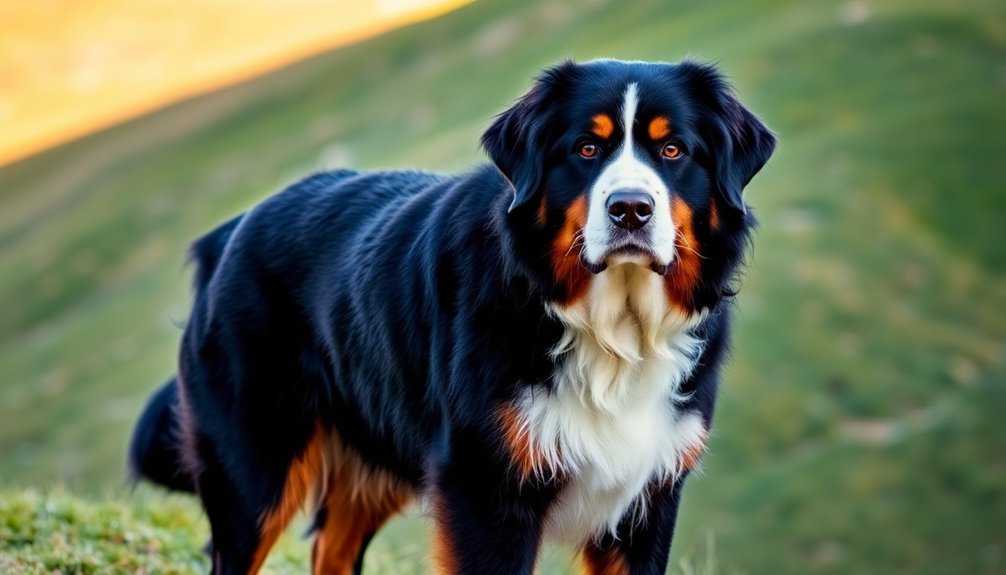
When you think about Bernese Mountain Dogs, their size and weight really stand out.
Males typically reach heights of 25 to 27.5 inches and weigh between 80 to 115 pounds, while females are slightly smaller.
Their striking tricolored coat, featuring black with white markings on the chest, adds to their impressive appearance. The breed's height ranges from 64 to 70 cm for males and 58 to 66 cm for females, making them one of the larger breeds.
Size, weight, and coat details
Bernese Mountain Dogs are impressive in size and stature, standing over two feet tall at the shoulder. Males typically measure between 25 to 27.5 inches, while females range from 23 to 26 inches. As they grow, you'll see them reach their full height by around one year old.
In terms of weight, males can weigh between 80 to 115 pounds, and females typically weigh 70 to 95 pounds. By the time they're fully grown at two years, you'll notice their substantial presence. Adult males weigh around 80-115 lbs, which makes them one of the largest dog breeds.
Their thick, double coat is a standout feature, marked by a moderately long and wavy or straight texture. The coat, which is usually black with tan or chestnut, requires regular maintenance.
You'll need to brush them weekly, bathe them as needed, and step up grooming during shedding season, which occurs once or twice a year and lasts for about 3 to 6 weeks.
Remember that their puppy coat is soft and sheds out between 4 to 8 months, eventually replaced by a sleeker adult coat. Proper coat care helps ensure it remains healthy and doesn't trap dirt or moisture.
White Markings on Chest
The striking white markings on a Bernese Mountain Dog's chest create a distinctive feature that enhances its overall appearance. Typically forming an inverted cross, these white markings are moderately broad and uninterrupted, extending to under the chin.
You'll notice that the white patch should be clean and bright, without any black ticks or stripes, allowing the beautiful tan markings on each side to remain visible.
Symmetry is essential; the white markings shouldn't overshadow the tan, and they must be neatly placed to conform to breed standards. The white muzzle band, part of this chest marking, shouldn't extend beyond the corners of the mouth or reach the tan markings above the eyes. Additionally, any ground color other than black results in disqualification, emphasizing the importance of adhering to breed standards.
Deviations from these standards, like large white patches or asymmetry, are considered faults.
These white markings result from a lack of pigment, blending seamlessly with the black and tan colors to create the iconic tricolor pattern.
Understanding and appreciating these details not only helps you identify a Bernese Mountain Dog but also highlights the breed's unique charm and beauty.
Temperament and Personality
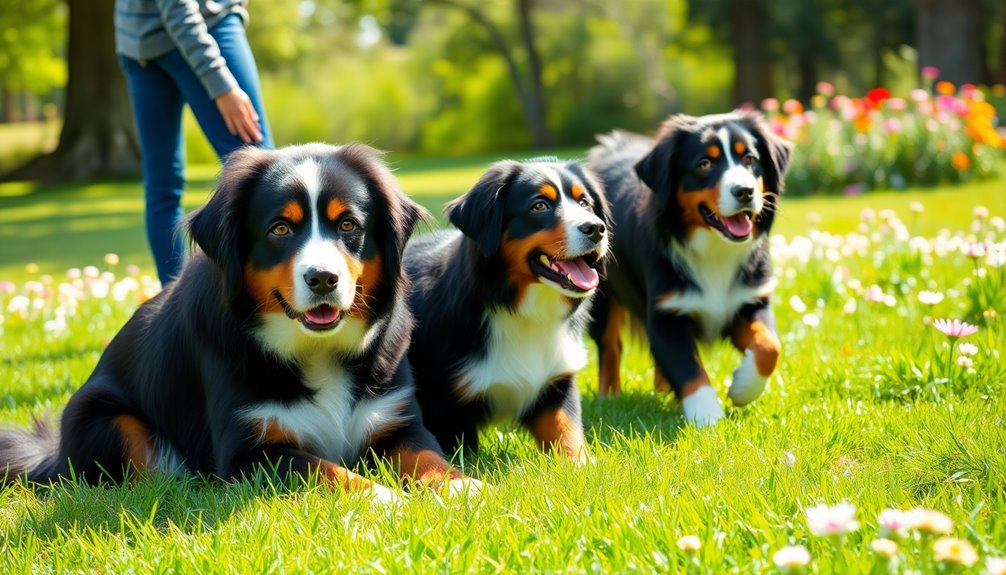
Bernese Mountain Dogs are known for their gentle and patient demeanor, making them fantastic companions for families and individuals alike. They easily get along with children and other pets, creating a warm, welcoming atmosphere in your home. Additionally, their hardy nature allows them to adapt well to various living situations, provided they receive adequate exercise and care. If you're looking for a loyal friend who thrives on social interaction, this breed might just be the perfect fit for you.
Gentle and Patient Demeanor
Embodying a gentle and patient demeanor, Bernese Mountain Dogs are often affectionately referred to as gentle giants. Their good-natured personality shines through, making them wonderful companions. Despite their large size, they maintain a calm and sweet disposition, which makes them excellent house dogs. The breed standard emphasizes their docility, ensuring they're neither aggressive nor anxious.
These dogs are highly affectionate, often showering their families with love through kisses and cuddles. They're remarkably patient, especially around children, able to tolerate little ones climbing over them without a fuss. You'll find that they form strong bonds with family members, often choosing one favorite person to devote themselves to. Bernese Mountain Dogs are particularly well-suited for active households, as they thrive in environments where they can engage in outdoor activities.
While playful, Bernese Mountain Dogs balance their exuberance with a calm demeanor, ensuring playtime doesn't become overwhelming. Their medium energy levels make them manageable in various living situations. They enjoy fun activities like hiking, and although they can move quickly when motivated, their gentle nature prevails.
With their intelligence and trainability, Bernese Mountain Dogs respond well to positive reinforcement, making them a joy to train and socialize, promoting their comfort and confidence in diverse settings.
Suitability for families, individuals, or other pets
For families, individuals, and those with other pets, Bernese Mountain Dogs shine as versatile companions. Their affectionate nature makes them ideal for family settings, as they form strong bonds and show unwavering loyalty. Their ability to develop self-regulation skills can help them navigate family dynamics effectively.
You'll appreciate their protective instincts, especially around children, though it's wise to supervise interactions due to their large size.
In terms of trainability, Bernese Mountain Dogs are intelligent and respond well to positive reinforcement. Training can be a family affair, allowing everyone to participate, which enhances their socialization and adaptability. Additionally, their high energy levels require consistent daily activities to keep them happy and healthy.
Early socialization is crucial, ensuring they're well-rounded and comfortable in various situations.
When it comes to other pets, Bernese Mountain Dogs generally get along well with dogs and can adapt to living with cats if introduced properly. Their friendly demeanor and lack of aggression contribute to a harmonious household.
While they thrive in spacious environments, they can adapt to apartment living with regular exercise and mental stimulation.
With a daily requirement of one to two hours of activity, they're perfect for home-loving owners who appreciate an affectionate companion.
Whether you have a family, are single, or have other pets, a Bernese Mountain Dog could be the perfect match for you.
Health and Lifespan
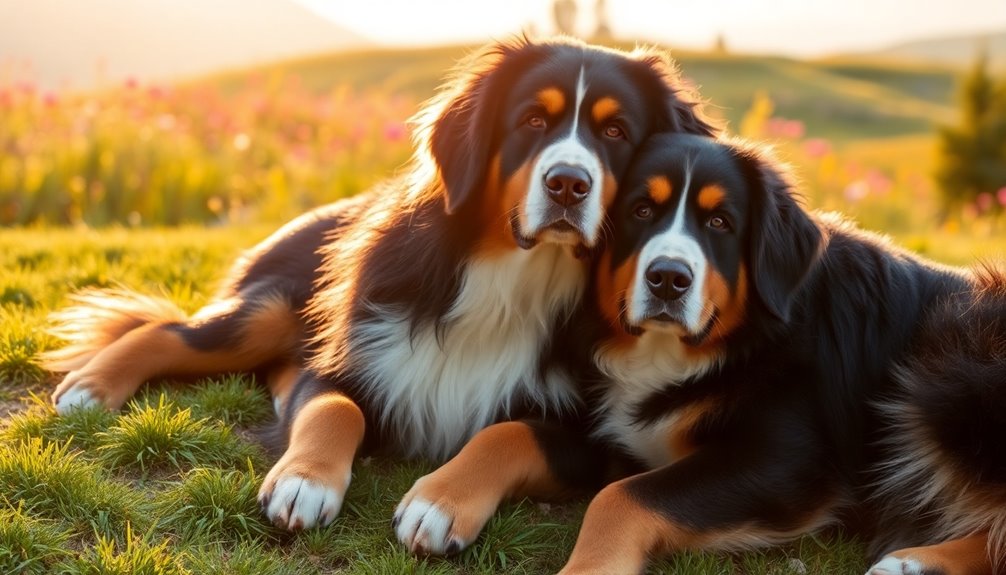
When it comes to your Bernese Mountain Dog's health and lifespan, understanding their typical life expectancy of 6 to 10 years is crucial. You'll also want to be aware of common health concerns like cancer and joint issues that can affect their quality of life. Proper nutrition and care can significantly enhance their overall health and potentially extend their lifespan.
Typical lifespan of the breed
Bernese Mountain Dogs typically have a lifespan ranging from 7 to 10 years, though some may live as short as 6 years or extend up to 14 years in exceptional cases.
Generally, their lifespan is shorter compared to other large dog breeds of similar size. Several factors influence how long your Bernese may live.
The size of the breed plays a significant role, as larger dogs tend to have shorter lifespans. Environmental conditions, like cleanliness and living space, can also affect their health and longevity. Cancer being the leading cause of early death significantly impacts the average lifespan of Bernese Mountain Dogs.
Genetic factors inherited from their parents are crucial in determining lifespan too. To promote a longer life, ensure your dog has a balanced diet and regular veterinary care to catch health issues early.
Engaging in daily exercise and providing mental stimulation are vital for maintaining their overall health. Joint supplements, as suggested by your vet, can help manage any issues that arise with age.
A comfortable, stress-free environment with regular grooming and check-ups is essential. By focusing on these lifestyle choices, you can help your Bernese Mountain Dog live a happier, healthier life within their typical lifespan range.
Common health concerns or genetic predispositions
Understanding the typical lifespan of Bernese Mountain Dogs also means recognizing their common health concerns and genetic predispositions. Unfortunately, these gentle giants face a high incidence of cancer, making it the leading cause of death in the breed. Malignant histiocytosis, which affects about 25% of cases, can progress rapidly, often leading to death within weeks.
Musculoskeletal issues are also prevalent, with hip and elbow dysplasia being common. Both conditions can result in arthritis, and as your Bernese ages, degenerative myelopathy may develop, leading to back muscle wasting and gait abnormalities. Regular exercise can help maintain joint health and mitigate some of these issues.
Gastrointestinal problems like bloat are particularly alarming. This life-threatening condition can escalate quickly, with symptoms such as anxious behavior and unproductive dry heaving. If untreated, bloat can prove fatal within 30 minutes.
Additionally, be aware of other health concerns such as von Willebrand Disease, progressive retinal atrophy (PRA) that can lead to blindness, and potential cardiac issues.
Regular veterinary check-ups are essential to catch these health problems early and manage them effectively, ensuring your Bernese Mountain Dog enjoys the best possible quality of life.
Tips for maintaining health and wellness
To maintain the health and wellness of your Bernese Mountain Dog, focus on a balanced approach that includes proper nutrition, regular exercise, grooming, and mental stimulation.
Start with a high-quality dog food tailored for large breeds, ensuring it's rich in proteins, healthy fats, and essential nutrients. Stick to a consistent feeding schedule to regulate digestion and metabolism. Incorporating anti-inflammatory foods can also support their overall health.
Daily walks, hikes, and playtime are crucial for maintaining a healthy weight and supporting joint health. Incorporate strenuous activities to tap into their working dog heritage. Outdoor adventures like camping can boost both their physical and mental well-being. Regular vet check-ups are essential for monitoring common health issues to ensure early detection and management.
Grooming is essential too; brush your dog a few times a week to manage shedding and prevent matting. Monthly baths, especially during heavy shedding seasons, will keep their skin and coat healthy.
Don't forget to brush their teeth regularly to combat tartar buildup.
Finally, provide mental stimulation through training sessions and puzzle toys. Early socialization is key to helping them adapt to various environments and other animals. Engaging in activities that challenge them mentally and physically will keep them happy and prevent destructive behaviors.
Care Requirements

When caring for your Bernese Mountain Dog, you'll need to pay attention to their grooming, exercise, and diet. Regular brushing is especially important during shedding seasons to keep their coat healthy. Additionally, ensure they get plenty of exercise and a balanced diet to support their energy levels and overall well-being. Regular brushing is essential due to their double-coated nature, which helps prevent matting and maintains their coat's health. To keep your home environment clean and healthy for both you and your dog, consider using an air purifier to reduce airborne allergens that may trigger allergies.
Brushing Frequency During Shedding
Brushing your Bernese Mountain Dog 2-3 times a week is essential to prevent matting and manage shedding. Consistent brushing helps keep their coat healthy and reduces the amount of loose hair around your home.
During shedding seasons, which typically occur in spring and fall, you'll need to increase the frequency to daily sessions if necessary. Start by using a slicker brush to remove loose hair from the outer coat. Then, employ an undercoat rake to tackle the dense undercoat and minimize shedding. A wide-toothed comb is handy for detangling any mats, especially in areas prone to tangles, like behind the ears, around the ruff, and the thigh area.
Always be gentle to avoid discomfort, particularly when dealing with mats. Regular brushing not only reduces shedding but also promotes bonding time between you and your dog. Additionally, regular brushing stimulates coat growth, which is crucial for maintaining the integrity of their double coat.
Additionally, consider monthly baths at a professional groomer to help manage shedding further. Combining these grooming techniques will ensure your Bernese Mountain Dog remains comfortable and looking great year-round.
Exercise requirements and energy levels
Bernese Mountain Dogs require at least an hour of exercise each day, which you can break into multiple sessions. Daily walks are essential; you can opt for long strolls in the morning and evening or shorter walks throughout the day.
To keep your dog engaged, incorporate playtime activities like fetch in a securely fenced yard. Consider hiking, agility training, or swimming to provide variety and keep them active.
It's important to adjust exercise based on age and energy levels, especially for puppies and senior dogs. While they possess high energy levels akin to breeds like Australian Shepherds, their endurance is limited, so multiple short exercise sessions work best. Additionally, Bernese Mountain Dogs are prone to certain health issues like hip dysplasia, making regular activity critical for maintaining joint health.
Mental stimulation is just as crucial; engage them with interactive toys or short training sessions. Be mindful of their sensitivity to heat, avoiding heavy exercise during hot weather.
Also, refrain from exercising right after meals to prevent bloat. Regular physical and mental activity is vital to prevent boredom and destructive behaviors, ensuring your Bernese Mountain Dog remains a happy and healthy companion.
Feeding tips and diet recommendations
Keeping your Bernese Mountain Dog happy and healthy goes beyond exercise; nutrition plays a vital role too. Focus on providing high-quality proteins to support muscle health and balanced fats, like fish oil, for energy. Incorporate complex carbohydrates from whole grains, vegetables, and fruits, along with essential vitamins and minerals such as calcium and vitamins A and E. Regular dietary evaluations and monitoring of nutrient intake are important for maintaining health.
To prevent obesity, practice portion control and monitor your dog's weight. Feeding two meals a day will aid digestion and help prevent bloat, so avoid vigorous exercise before and after meals. Elevated food bowls aren't recommended due to potential health risks, so stick with standard feeding practices.
For dietary considerations, puppies need more calories and careful calcium levels, while seniors benefit from a lower-calorie, higher-fiber diet. Adjust your dog's food according to their life stage to optimize health. Consider adding glucosamine and chondroitin for joint health in older dogs.
When it comes to treats, keep them healthy and low-calorie, ensuring they don't exceed 10% of your dog's daily caloric intake. Always consult your veterinarian before introducing any dietary supplements to ensure your Bernese is getting the best care possible.
Training and Socialization
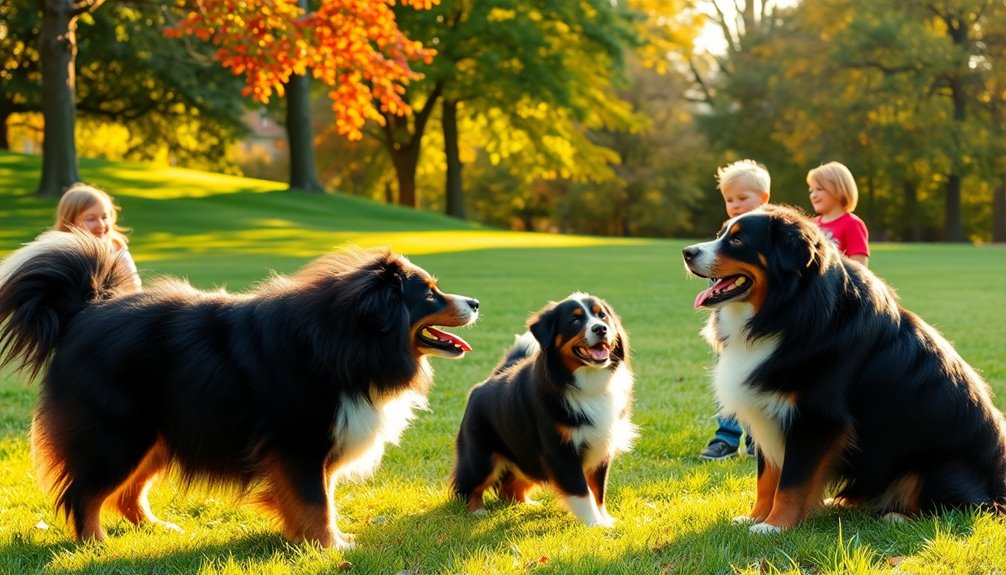
When training your Bernese Mountain Dog, you'll find they're moderately responsive to commands, so patience is key. Gradually introducing them to new environments can help ease any separation anxiety during training sessions. Additionally, focusing on early socialization will help build their confidence and adaptability, making training sessions more effective.
Moderately Responsive to Commands
Many owners find Bernese Mountain Dogs to be moderately responsive to commands, thanks to their eagerness to please and high intelligence. While they're generally easy to train, you'll want to use positive reinforcement, as harsh feedback can backfire.
Keep training sessions short—about 10 to 15 minutes, two to three times a day—to maintain focus. Use clear, simple commands like "sit," "stay," "down," and "come" to prevent confusion. Additionally, these dogs thrive in environments where they can enjoy ample space to roam and explore, enhancing their overall training experience.
Patience is vital; your Bernese may not grasp commands immediately. Start training as early as 8 weeks old to establish a solid foundation. Consistency is key, so use the same voice and hand signals for each command.
Besides basic commands, teaching "off" and combined commands like "sit/stay" and "down/stay" will enhance obedience.
Consider enrolling in obedience classes for additional socialization and training benefits. A calm, positive demeanor during training helps keep your dog engaged and excited about learning.
Gradual Introductions to New Environments
Introducing your Bernese Mountain Dog to new environments is crucial for their development and socialization. Begin by training in a quiet, distraction-free area. Here, teach basic commands like sit, stay, and come.
As your dog becomes comfortable, gradually introduce new sights, smells, and sounds to prevent overwhelming them. Keep these initial sessions short—around 15 minutes—to maintain focus, rewarding your dog with treats and praise for positive behavior. Regular exercise is also important to help your dog manage their excitement in new situations.
Once your dog is confident in one area, start exploring other parts of your home. Include spaces where family members gather to help them adjust to different people. Consistency is key, so ensure everyone uses the same commands and training methods.
When you're ready for outdoor adventures, start in less crowded areas before moving to busier spaces. Leash training is essential for safety and control. Expose your dog to various people, animals, and experiences to enhance their socialization.
Consider enrolling in socialization classes, like puppy kindergarten, to further expand their interactions. Monitor your dog's body language to respond appropriately to their needs, fostering a well-adjusted and confident companion.
Separation Anxiety During Training
Separation anxiety can be a significant hurdle during training for your Bernese Mountain Dog, impacting their ability to learn and adapt. To tackle this, start with a desensitization process. Gradually expose your dog to your absence, beginning with short durations and increasing the time as they become more comfortable.
Create a safe environment, avoiding departure cues that might trigger anxiety. Identify and eliminate common departure cues that may cause stress, ensuring a calmer atmosphere for your dog.
Structured training sessions are essential. Choose a calming space and set consistent cues like white noise. Determine your dog's anxiety threshold and set achievable goals for each session, including cool-down periods with shorter departures.
Positive reinforcement is crucial. Reward calm behavior with treats, praise, or playtime, and steer clear of punishment. Keeping training sessions engaging will help maintain their interest.
Establish consistency and routine among all household members. Develop a daily schedule for departures and returns, ensuring your dog knows when to expect you back.
Lastly, consider arranging care when you're away. Hiring a dog sitter or utilizing daycare can ease their anxiety.
With patience and the right methods, you can help your Bernese Mountain Dog feel secure, making training more effective and enjoyable.
Ideal Living Environment
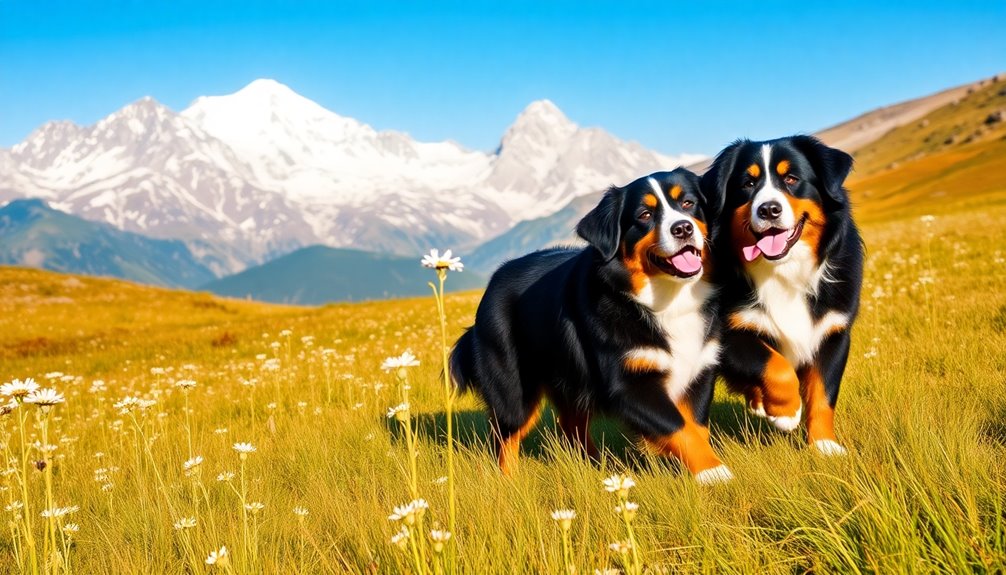
When considering a Bernese Mountain Dog, you'll want a spacious home with easy outdoor access. These dogs thrive in cooler climates and can't handle heat well, so having a shaded area or air-conditioned space is essential. Ensuring they've room to roam and play will keep them happy and healthy. Additionally, it's important to ensure constant access to fresh water during hot days to keep them hydrated.
Spacious Home With Outdoor Access
A spacious home with outdoor access is essential for Bernese Mountain Dogs, as they thrive in environments that offer both room to roam and opportunities for physical activity.
These gentle giants need at least one hour of exercise daily, broken into manageable sessions. Regular walks, playtime in a securely fenced yard, and activities like hiking or swimming provide the perfect outlet for their energy. Additionally, maintaining a balanced diet is critical to prevent obesity and ensure overall health.
When outdoors, ensure they've access to cool, shaded areas and plenty of fresh water, especially on hot days. Fans or air conditioning can keep them comfortable, while a cool basement or tiled flooring offers a cozy resting spot.
While they enjoy the outdoors, Berners are better suited for living indoors with your family, where they can stay engaged and stimulated.
For puppies and seniors, it's crucial to monitor their activity levels. Young pups require short, controlled play sessions to protect their growing joints, while older dogs benefit from gentle exercise.
Always prioritize their well-being, providing mental stimulation as a healthy alternative to physical activity when needed. A spacious, safe environment will help your Bernese Mountain Dog thrive.
Prefers Cooler Climates Over Heat
Bernese Mountain Dogs are happiest in cooler climates, thanks to their thick, double coats that keep them warm in frigid temperatures. Ideally, they thrive in environments where temperatures rarely exceed 75°F, similar to their native Swiss Alps. In fact, these dogs are more prone to heat-related issues compared to lighter-coated breeds, making their comfort in cooler environments all the more important.
If you live in a hot or humid climate, it's crucial to monitor your dog closely, as they can struggle with heat intolerance, leading to serious health risks like heat exhaustion and heat stroke.
To keep your Bernese comfortable during warmer days, provide plenty of shade and fresh water. Limit outdoor activities to the cooler parts of the day, such as early mornings or late evenings. You might also consider using cooling aids like vests or mats and ensure they've access to air-conditioned spaces or cool basements.
Regular grooming helps remove loose hair, facilitating better heat dissipation. Always keep an eye on your dog's behavior; signs like excessive panting, fatigue, or disorientation can indicate overheating.
Unique Tri-Color Coat Pattern
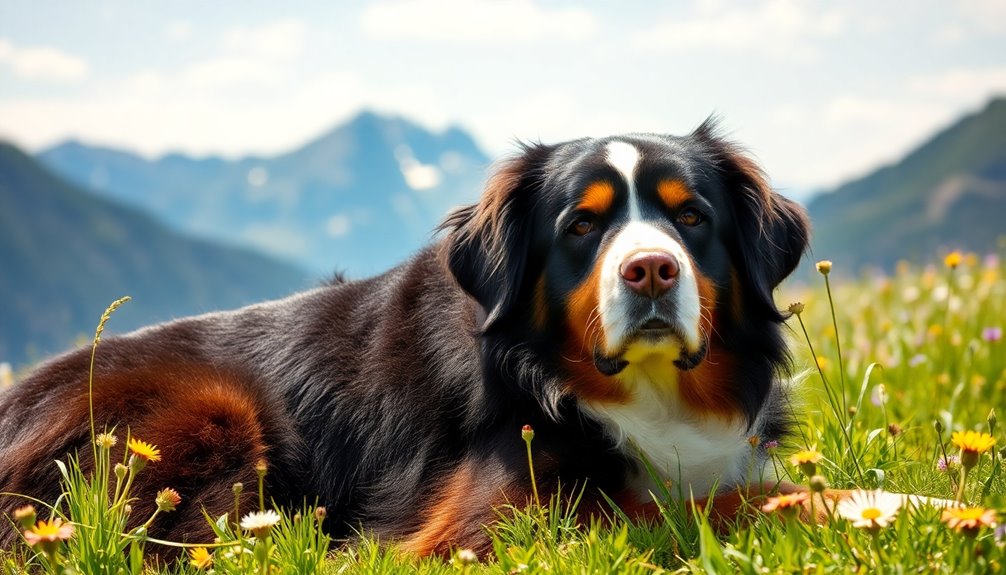
When you think of Bernese Mountain Dogs, their unique tri-color coat pattern often comes to mind.
Originating as Swiss farm dogs, this striking appearance not only defines the breed but also gained fame through movies like 'Beethoven.' The combination of black, white, and brown makes them truly stand out in any setting. Many enthusiasts are particularly drawn to the classic black tri-color coat due to its high-contrast and eye-catching aesthetic.
Originated as Swiss Farm Dogs
Originating as Swiss farm dogs, the Bernese Mountain Dog boasts a unique tri-color coat pattern that sets it apart from other breeds. Developed in the agricultural region of Bern, Switzerland, these dogs were bred from crosses of Mastiffs and guard-type breeds, serving various roles on farms.
You'd find them pulling carts, driving cattle, and protecting the farmyard, making them invaluable to small farmers who couldn't afford horses for transporting fresh milk, cheese, and other produce. As one of four Swiss Mountain dog breeds, the Bernese Mountain Dog played a significant role in the dairy industry, contributing to Switzerland's famous chocolate and cheese.
However, by the mid-1800s, their numbers dwindled, almost leading to their extinction. Thankfully, a Swiss innkeeper in 1892 took the initiative to revive the breed, and by 1912, it was officially recognized.
Their distinctive coat features a black base with striking white markings and rich rust-brown accents, giving them a classic appearance. Known for being excellent family companions, the Bernese Mountain Dog also fosters strong bonds with its human family members.
Although a Black Tan & White variation exists, it's less common. The Bernese Mountain Dog's unique tri-color coat truly symbolizes its heritage as a devoted farm companion.
Featured in 'Beethoven' Movies
The lovable Bernese Mountain Dog became a household name thanks to its prominent role in the "Beethoven" movies, captivating audiences with its unique tri-color coat pattern.
These dogs showcase a striking mix of jet black as their base color, complemented by rich rust or chestnut markings on their eyebrows, cheeks, legs, and under the tail. You can't miss the distinctive white markings, which appear on the blaze, muzzle, chest, paws, and tail tip, creating a symmetrical and eye-catching appearance. Bernese Mountain Dogs are often crossed with Poodles to create Bernedoodles, a breed known for their charming personalities.
Bernese Mountain Dogs have a thick, double-layered coat that boasts a slightly coarse outer layer and a soft inner layer, providing warmth and water resistance. Their fur can grow to a moderate length and may be straight or wavy, requiring regular grooming—weekly brushing and baths every 4-8 weeks—to keep it looking its best.
This unique tri-color coat isn't just for show; it plays a significant role in identifying purebred Bernese Mountain Dogs. According to breed standards, any deviation from this tri-color pattern disqualifies them from being considered purebred, making their distinctive look essential to their identity.
Family-Friendly Companion for All
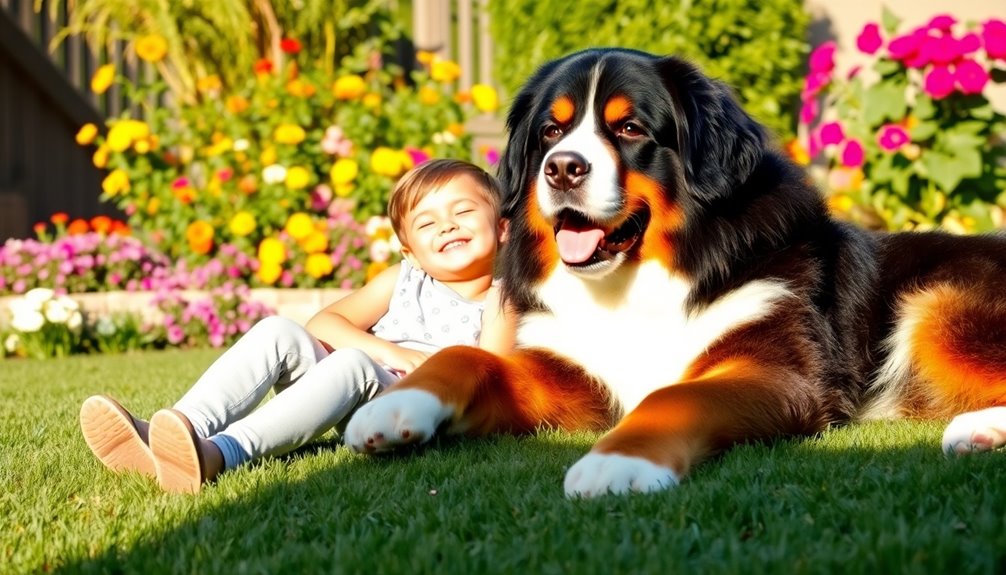
If you're looking for a family-friendly companion, Bernese Mountain Dogs are an excellent choice for active households. They thrive on engagement and love being part of family activities, making them perfect for your energetic kids. Just keep in mind their grooming needs and shedding, which require regular attention to keep your home tidy. Their protective instincts help ensure the safety of your family, adding an extra layer of comfort to your home environment.
Ideal for Active Families
Bernese Mountain Dogs are truly ideal companions for active families, thanks to their friendly and affectionate nature. Their gentle temperament makes them excellent family pets, especially in households with children. You'll find that these dogs are patient and tolerant, perfect for handling energetic kids who want to play. They form strong bonds with their families, showing unwavering loyalty and devotion.
To keep your Bernese happy and healthy, plan for at least an hour of exercise each day, broken into multiple sessions. Activities like walking, fetch, hiking, and even swimming will keep them engaged and help manage their energy levels.
Remember, while puppies need restricted exercise to protect their growing joints, adult Bernese dogs thrive on regular physical activity. Their intelligence and eagerness to please make training a breeze. With early training and positive reinforcement, your Bernese will learn quickly and enjoy mental stimulation through activities like puzzle toys. Engaging in physical activities not only keeps them fit but also enhances their overall development.
They generally get along well with children and other pets, but it's always wise to supervise interactions due to their larger size. Including them in family activities will strengthen your bond and create lasting memories together.
Grooming Needs and Shedding
Keeping your Bernese Mountain Dog healthy and happy goes beyond exercise; grooming plays a vital role too. You'll want to brush your pup at least once a week to prevent matting and control shedding. During shedding seasons, aim for several times a week or even daily brushing. Monthly baths are recommended, though you might need to bathe more often in spring and fall. Tools like the FURminator can help manage that excess fur. Additionally, frequent brushing helps remove loose fur effectively.
Remember, your Bernese has a double coat that shouldn't be shaved or trimmed for health reasons. You can use scissoring to tidy up the silhouette without altering the coat's length. The undercoat sheds naturally twice a year, while the topcoat provides essential protection.
For bathing, use a dog shampoo to keep their skin healthy and report any changes like redness to your vet.
Essential grooming tools include slicker brushes, wide-toothed combs, and undercoat rakes. Don't forget nail trimmers and ear cleaning solutions for their overall grooming needs.
Regular grooming not only keeps them looking great but also strengthens the bond between you and your gentle giant.
Frequently Asked Questions
Do Bernese Mountain Dogs Shed a Lot?
Yes, Bernese Mountain Dogs do shed a lot.
They've a double coat that requires regular grooming to manage shedding effectively. You'll notice significant shedding during seasonal changes, particularly in spring and fall, as they transition between coats.
Establishing a consistent grooming routine with quality tools will help keep your home tidy and your dog's coat healthy.
Paying attention to their diet and health can also minimize excessive shedding.
What Is the Average Cost of a Bernese Mountain Dog?
The average cost of a Bernese Mountain Dog puppy ranges from $1,000 to $5,000, depending on factors like region and breeder pedigree.
If you're considering an adult dog, expect to pay between $1,200 and $3,000.
Adoption fees are generally lower, starting at a few hundred dollars.
Are Bernese Mountain Dogs Good With Other Pets?
Yes, Bernese Mountain Dogs can be good with other pets.
They typically get along well with cats and other animals when properly socialized from a young age. Their gentle nature makes them less likely to show aggression, but you'll need to supervise introductions and use positive reinforcement training.
If you have other pets, especially farm animals, ensure they're introduced carefully to maintain harmony in your household.
Early socialization is key to their success!
How Much Exercise Do Bernese Mountain Dogs Need Daily?
Bernese Mountain Dogs need at least an hour of exercise daily.
It's best to split this into two or more shorter sessions to keep them engaged and energized.
Mix in walks, playtime, and training to maintain their interest.
Remember to adjust the intensity based on their age and energy levels.
Always consider the weather, especially on hot days, to ensure they stay safe and healthy while enjoying their exercise routine.
What Are Common Behavioral Issues in Bernese Mountain Dogs?
Common behavioral issues in Bernese Mountain Dogs often stem from lack of training and socialization.
If you don't start training early, your dog might develop anxiety, aggression, or destructive behaviors. They can also become overly protective without strong leadership from you.
Additionally, without proper mental and physical stimulation, boredom can lead to excessive barking and other unwanted behaviors.
Consistent positive reinforcement and engaging activities will help prevent these issues and ensure a well-adjusted companion.
Conclusion
In conclusion, Bernese Mountain Dogs truly embody the essence of gentle giants. With their loving nature, striking tri-color coats, and friendly demeanor, they make perfect family companions. By understanding their needs for training, socialization, and a suitable living environment, you can create a fulfilling life for both you and your furry friend. If you're looking for a loyal and affectionate addition to your family, a Bernese Mountain Dog might just be the ideal choice for you!

